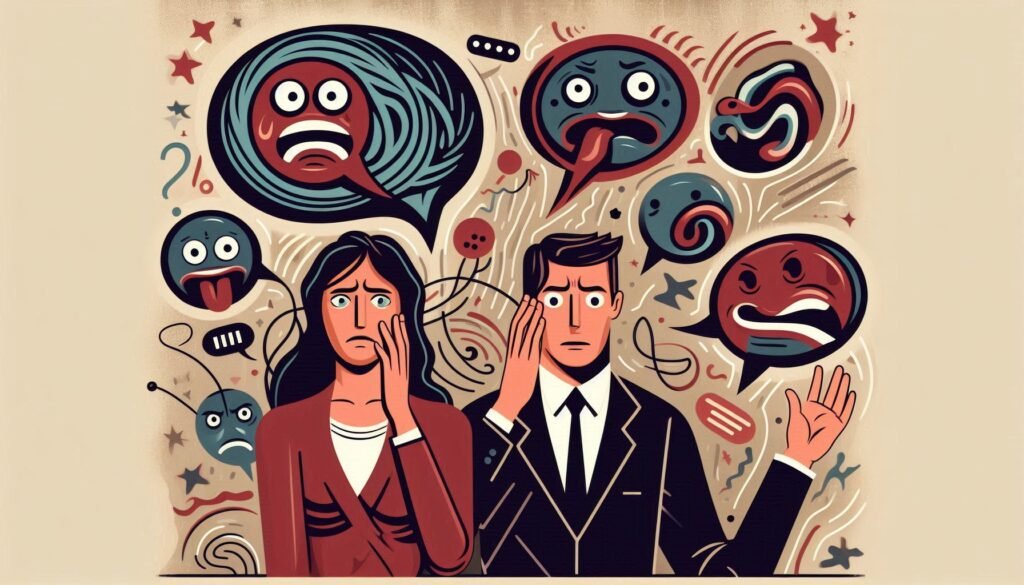In the intricate dance of human interaction, neuroticism and sarcasm often waltz together in unexpected ways. Picture this: a witty remark flutters through the air, cloaked in irony, while someone grapples with emotional sensitivity just beneath the surface. This dynamic creates an intriguing landscape filled with both humor and potential misunderstandings.
Neurotic individuals might be more attuned to social nuances, but their heightened sensitivity can make navigating sarcastic exchanges tricky. Sarcasm can serve as a protective shield or a double-edged sword—offering relief from anxiety yet risking misinterpretation. As we delve deeper into this topic, we’ll explore how these two elements influence one another in various social contexts.
Join us on this journey as we unravel the complexities of neuroticism and sarcasm in social interactions. By understanding their interplay, you may find new insights that enhance your communication skills and improve your relationships.

Understanding Neuroticism: Emotional Sensitivity and Social Behavior
Neuroticism is a personality trait characterized by emotional instability and heightened sensitivity. Individuals high in neuroticism often experience anxiety, mood swings, and irritability. These emotional responses can significantly shape their social behavior.
In social settings, neurotic individuals may feel overwhelmed by interpersonal dynamics. Their tendency to overthink situations can lead to misinterpretation of others’ intentions or remarks. This constant state of vigilance means they might perceive neutral comments as negative or critical.
Furthermore, their emotional sensitivity often drives them to seek reassurance from friends and family. They may crave validation but fear rejection at the same time, leading to potential conflicts in relationships. This tug-of-war can complicate how they engage with sarcasm—a form of communication that relies on subtlety.
Navigating social interactions becomes a delicate balancing act for those with high levels of neuroticism. Understanding these patterns is essential for fostering healthier connections while minimizing misunderstandings over tone and intent.
The Psychology of Sarcasm: Cognitive Processes and Social Functions
Sarcasm is a complex form of communication that relies heavily on context and tone. It often involves saying one thing while meaning another, which requires cognitive abilities to understand both the literal and intended meanings. This dual processing engages various parts of the brain, particularly areas responsible for social cognition.
Socially, sarcasm serves multiple functions. It can be a tool for humor, fostering camaraderie among friends or lightening tense situations. When used effectively, it creates an atmosphere where people feel comfortable expressing their thoughts without rigid constraints.
However, sarcasm also has its risks. Misinterpretation can lead to confusion or hurt feelings if the recipient fails to grasp the speaker’s intent. This misunderstanding is especially prevalent in diverse groups where cultural differences shape how sarcasm is perceived.
In relationships, sarcastic exchanges might highlight underlying tensions or insecurities too. While some may use it as a shield against vulnerability, others could find themselves feeling alienated by such interactions instead of connected.
Neuroticism’s Influence on Sarcasm Production and Interpretation
Neuroticism significantly shapes how individuals produce and interpret sarcasm. People high in neurotic traits often experience heightened emotional sensitivity, making them more attuned to subtle cues in social interactions. This sensitivity can enhance their ability to detect sarcasm, allowing for a nuanced understanding of others’ intentions.
However, this same sensitivity may lead to overthinking or misinterpretation. Neurotic individuals might perceive sarcastic remarks as personal slights rather than playful banter. Their tendency towards anxiety can skew the interpretation of these comments, complicating relationships.
Moreover, those with higher levels of neuroticism may employ sarcasm as a defense mechanism. By using biting humor, they deflect their insecurities or fears about social situations. This tactic can create a barrier that prevents genuine connection.
Conversely, when delivering sarcastic comments themselves, they might struggle with timing and delivery due to underlying worries about reception. The interplay between neuroticism and sarcasm is complex and multifaceted within social contexts.
The Double-Edged Sword: Sarcasm as a Coping Mechanism for Neurotic Individuals
For neurotic individuals, sarcasm can serve as a unique coping mechanism. It provides an outlet for expressing feelings of anxiety and insecurity in social contexts. By masking their true emotions with humor, they often create a buffer against vulnerability.
This form of wit allows them to engage socially while maintaining emotional distance. When used effectively, sarcasm can lighten tense situations and foster connections through shared laughter. However, the balance is delicate; overuse may alienate peers or provoke misunderstandings.
Moreover, relying on sarcasm risks reinforcing negative thought patterns. Neurotic individuals might lean into self-deprecating remarks that perpetuate feelings of inadequacy rather than encouraging genuine interaction.
In this way, while sarcasm offers temporary relief from stressors, it may also hinder deeper emotional connection and authenticity in relationships. Finding equilibrium between humor and sincerity is essential for healthier social interactions.
Misinterpretation Risks: Neuroticism and the Perception of Sarcastic Remarks
Individuals high in neuroticism often experience heightened emotional sensitivity. This can significantly affect how they interpret sarcastic remarks during social interactions. What might come off as playful banter to others can feel like a personal attack to someone with neurotic tendencies.
The cognitive processes underlying sarcasm are complex and nuanced. Neurotic individuals may struggle to identify the tone or intent behind sarcastic comments, leading to misunderstandings. Their focus on potential threats in communication creates an environment ripe for misinterpretation.
Moreover, this misunderstanding doesn’t just stop at the immediate conversation. It can foster feelings of anxiety, self-doubt, or even resentment towards those who use sarcasm casually. The perceived negativity intensifies their emotional reactions and alters future social dynamics.
This pattern also affects relationships. Friends and family may become hesitant to engage in humor if they fear their jokes will be taken too seriously or misunderstood altogether. Such hesitancy further isolates neurotic individuals, perpetuating a cycle of miscommunication and withdrawal from social settings.
Emotional Impact: How Sarcasm Affects Neurotic Individuals in Social Settings
Sarcasm can have a profound emotional impact on neurotic individuals in social settings. For those who are more emotionally sensitive, sarcastic remarks may be perceived as criticism or rejection. This heightened sensitivity can amplify feelings of anxiety and insecurity.
Because neurotic individuals often struggle with self-esteem, they might internalize sarcasm more than others would. What may seem like harmless banter to some can feel like a personal attack to them. Their reactions could lead to withdrawal from social interactions or increased defensiveness.
Additionally, the unpredictable nature of sarcasm complicates communication for neurotic people. They may find it challenging to discern when someone is being genuinely playful versus when they’re aiming for humor at their expense.
Emotional dysregulation commonly associated with neuroticism means that these individuals might react strongly during conversations laced with sarcasm. A seemingly light-hearted comment may trigger unexpected emotional responses, influencing overall group dynamics significantly.
Cultural and Contextual Factors in Sarcasm Use Among Neurotic Individuals
Cultural background plays a significant role in how sarcasm is perceived and used. Different cultures have varying norms regarding humor, irony, and wit. In some societies, sarcasm may be embraced as an art form, while in others, it can be seen as disrespectful or inappropriate. For neurotic individuals navigating these cultural landscapes, understanding the local context becomes crucial.
Context also influences sarcasm’s effectiveness. Situational factors like the setting—whether it’s a casual gathering or a formal event—can dictate when and how sarcastic remarks are delivered. Neurotic people might misread these cues due to their heightened emotional sensitivity.
Additionally, familiarity with one’s audience shapes responses to sarcasm. Close friends may appreciate sarcastic banter more than acquaintances who might take comments literally. Misunderstandings can arise easily for neurotics if they fail to gauge the social dynamics adequately.
Both culture and context create unique layers of complexity in using sarcasm effectively within interpersonal interactions for those high in neuroticism.
Gender Differences in Sarcasm Use and Perception Related to Neuroticism
Gender differences play a crucial role in how sarcasm is utilized and interpreted, particularly among neurotic individuals. Research indicates that women are generally more adept at recognizing sarcasm than men. This heightened sensitivity may stem from social conditioning that encourages emotional awareness.
Neuroticism adds another layer to this dynamic. Men with higher levels of neuroticism might struggle more with understanding sarcastic remarks, often perceiving them as personal attacks rather than humor. In contrast, neurotic women may use sarcasm as a shield against vulnerability, employing it to navigate social situations.
Moreover, men tend to lean into direct communication styles while women frequently employ indirect methods like sarcasm. This difference can result in misunderstandings between genders where intentions become clouded by emotional sensitivities tied to neurotic traits.
Cultural norms also shape these behaviors, influencing how gender roles dictate the appropriateness of sarcasm in various contexts. Understanding these nuances can lead to better interpersonal relationships and improved communication strategies for everyone involved.
Developing Sarcasm Competence: Strategies for Neurotic Individuals
Developing sarcasm competence is vital for neurotic individuals who may struggle with social nuances. One effective strategy is to observe and analyze conversations in various settings, paying attention to how others use sarcasm. This helps in understanding the subtleties of tone and context.
Practicing within a safe environment can also build confidence. Engaging with trusted friends or family allows neurotic individuals to experiment without fear of misinterpretation. Role-playing different scenarios can enhance their ability to deliver sarcastic remarks effectively.
It’s essential to learn when sarcasm is appropriate. Recognizing cues from others, such as facial expressions and body language, can guide timing and delivery. Being mindful of these signals reduces the risk of offending someone inadvertently.
Additionally, reflecting on past experiences where sarcasm led to misunderstandings can provide valuable insights. Learning from these moments encourages better judgment in future interactions while fostering emotional resilience amidst social challenges.
Therapeutic Approaches: Addressing Sarcasm-Related Issues in Neurotic Clients
Addressing sarcasm-related issues in neurotic clients requires a nuanced approach. Therapists often start by fostering an open dialogue about the client’s experiences and feelings toward sarcasm. This understanding helps to identify patterns of behavior that may stem from their neurotic tendencies.
Cognitive-behavioral therapy (CBT) is particularly effective. It allows clients to challenge negative thought patterns associated with sarcastic remarks, helping them reframe their perceptions. Role-playing exercises can also be beneficial, enabling clients to practice interpreting sarcasm in various social contexts without emotional distress.
Mindfulness techniques play a crucial role as well. By becoming more aware of their emotional responses, neurotic individuals can learn to pause before reacting defensively or misinterpreting humor. Additionally, focusing on assertive communication skills equips them with tools for expressing discomfort or seeking clarification when faced with sarcasm.
Therapists might introduce journaling as a way for clients to reflect on interactions that involve wit and irony. This reflection encourages greater insight into how sarcasm affects their emotions and relationships.
Addressing these challenges not only fosters better social interactions but also aids neurotic individuals in navigating the complexities of humor and emotional sensitivity effectively.


